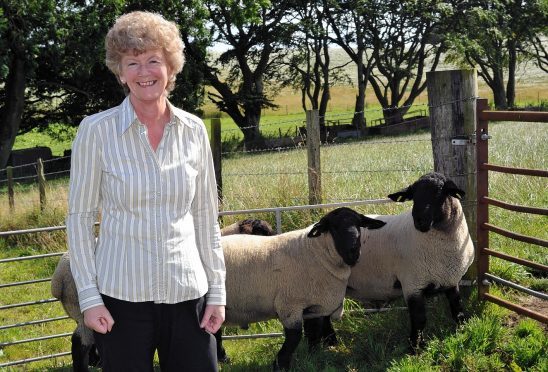Aberdeenshire farmer Irene Fowlie recently won the British Farming Award for Innovation in Sheep Farming. Douglas Ross took a look at what makes Mrs Fowlie’s practises innovative
An even mix of hands-on farming and embracing modern technology; that is the secret according to pedigree Suffolk breeder Irene Fowlie.
Mrs Fowlie won the British Farming Award last month for her innovation and use of modern techniques when rearing and breeding her flock of Essie Suffolks.
“What we’ve done is we’ve used a combination of the physical attributes of the sheep but we’ve (also) used science, genetic technology, to help us breed high performance recorded sheep” said Mrs Fowlie, who breeds her Essie Suffolks on the family-owned Adziel Farm, near Fraserburgh.
The physical attributes of the sheep come from a basis of good lineage and natural grazing.
The innovation comes at eight weeks for both ram and ewe lambs when they are weighed and their results are entered into a programme with other Suffolk breeders, from all over Britain, where they are compared.
From the very start of this process, Mrs Fowlie’s ram and ewe lambs have ranked near the top every time.
At 21 weeks a technician weighs the sheep again but also conducts an ultrasonic scan.
The scan creates an image of how a lamb chop would develop, measuring depth of fat and muscle.
All of this data is then put into another computer programme which includes the same data from the sheep’s lineage, giving Mrs Fowlie a highly calculated and accurate breeding value.
To add onto the already stringent formula for breeding success, Mrs Fowlie then takes 15 of her lambs down to SRUC in Edinburgh and has them CT scanned.
This scan then tells her where the meat is on the lamb, the size of gigot and loin, and the meat to bone ration.
Mrs Fowlie believes this extra information of the weight and position of the meat on the sheep adds even more accuracy to their breeding value.
This intense scientific calculating is only half the story of why she won the award according to Mrs Fowlie, who said: “It’s got to be a combination of stockmanship and science.”
Essie Suffolks have been at the top of the British lamb charts since the records began being kept and compared.
In 2011 they had the top ram lamb in Britain, while this year they had the top ram lamb and ewe lamb.
Four years ago, after having the top performing ram lamb in the UK, they were approached by a farm in Canada to export semen.
At the time they had no semen frozen but since have decided to freeze, store and sell semen across the world.
They now export semen to Norway, Sweden, Czech Republic and Canada as well as selling ram lambs to Romania and Canada.
Mireille Theriault, Quebec, Canada, said: “We imported 350 dozes of semen from three Essie Rams. 242 were AI’d over four flocks. The first 34 ewes gave birth to 77 lambs and globally we have fertility results over 70%. We are very happy with the semen quality and the lambs too.”
Mrs Fowlie prides herself on providing a quality product for her customers which is the one of the main things driving her to produce such high quality sheep.
Never being happy to rest on her laurels, she is still looking at new ways to improve and move her flock and business forward.
The next step in the Adziel farm story is a spring lambing from home ewes coming off of a pure New Zealand ram.
Mrs Fowlie said: “There is a perception that the New Zealanders see the way forward, that their style of ram is the easy lambing type of ram so I feel I should give my buyers a choice. So they can have my breeding and there is a small number of half New Zealand/half our breeding.”
It is this forward thinking that has meant that Mrs Fowlie was not only one of the few Scottish farmers nominated for a British Farming Award, but she was the only Scottish winner.
Sheep innovator is a category traditionally dominated by Lancashire and Yorkshire farmers, with very little room for anyone from Scotland.
Driving past the large English farms on their way to the awards ceremony in Worcester it was excusable for the Fowlies to be happy just to be nominated, never mind winning.
When asked about the future of British farming, Mrs Fowlie said: “I think the future is definitely a combination of looking at animals that look good, that look the part, but not only do they look good but inside them they have the potential of producing fast growing lambs.”
